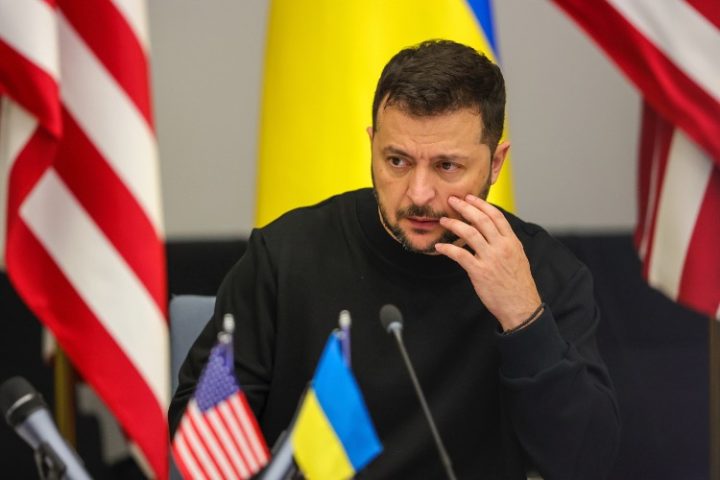
The United States is running out of money for Ukraine unless Congress authorizes additional funding, U.S. National Security Council spokesman John Kirby told reporters on October 11.
“In the near term, we’ve got appropriations and authorities for both Ukraine and for Israel,” Kirby declared during the daily press briefing. “But you don’t want to be trying to bake in long-term support when you’re at the end of the rope.”
“And in Ukraine, on the Ukraine funding, we’re coming near to the end of the rope,” he added. “Today we announced $200 million, and we’ll keep that aid going as long as we can, but it’s not going to be indefinite.”
When asked to clarify what he meant by “near term,” Kirby replied that he could not indicate a specific date, as that would hinge upon how rapidly Ukraine and Israel use their equipment and arms “or what the need is and what our ability to do it is.”
On October 10, a Pentagon spokesperson assured reporters that the United States could “continue our support both to Ukraine, Israel, and maintain our own global readiness.”
Nonetheless, Kirby acknowledged that the money previously set aside for Ukraine by Congress was “not going to last forever” and that lawmakers need to approve more as soon as possible.
“The sooner there’s a speaker of the House, obviously, the more comfortable we’ll all be in terms of being able to support Israel and Ukraine,” Kirby stated.
The House of Representatives has not had a speaker since last Tuesday, when Kevin McCarthy became the first-ever speaker to be deposed in a House vote, over a purported clandestine deal with the White House to authorize more Ukraine aid.
Meanwhile, Ukrainian President Volodymyr Zelensky is hoping to visit Israel to support Israeli Prime Minister Benjamin Netanyahu’s campaign against Gaza, as per reports by Axios on October 11.
Zelensky’s office has sent Netanyahu’s office an official request to arrange a visit, the U.S. outlet reported, quoting unnamed officials from both Ukraine and Israel. Axios contended that such a visit would “boost international support for Israel’s counteroffensive against Hamas in Gaza.”
The arrangements are still in their early phases, with no date set as of yet, based on Axios’ sources. Neither government would verify or dismiss the report, nevertheless.
For his part, Zelensky visited Romania on October 10, where he met Prime Minister Marcel Ciolacu. Since October 7, when Hamas fired rockets into Israel, the Russo-Ukrainian conflict has largely been sidelined in Western media.
Zelensky bemoaned this media sidelining in Romania. “If international attention shifts away from Ukraine, one way or another, it will have consequences,” he told France 2. “The fate of Ukraine depends on the unity of the rest of the world,” he added, voicing hope that Washington would ensure continued aid.
Besides, Zelensky alleged that Moscow was to blame for the attack by the Palestinian militant movement.
Russia “helped Hamas and is behind Hamas,” Zelensky posited, without providing any substantiated evidence, alluding instead to “signals” on social media.
Previously, Zelensky divulged that, based on Ukrainian intelligence services, Russia was “interested in triggering a war in the Middle East” to “undermine world unity” and “destroy freedom in Europe.”
Israel’s ambassador to Moscow, Alexander Ben Zvi, has dismissed Zelensky’s claims as “complete nonsense,” and said his government did not think that Russia was involved “in any way.”
Russian Foreign Ministry spokeswoman Maria Zakharova decried Zelensky’s comments, hinting that they may have been triggered by substance abuse.
Kremlin spokesman Dmitry Peskov highlighted Moscow’s “balanced approach” to talk to both Israeli and Palestinian sides, indicating that such an approach would permit Russia to help broker a settlement. Additionally, Peskov mocked Zelensky, saying that the latter must be jealous that the United States now has to channel military aid to Israel.
Also, Kirby declared in an interview with Voice of America, as reported by European Pravda, that as in the case with Iran, the United States has not seen any proof that Russia was in any way directly responsible for the recent attacks by Hamas on Israel since October 7. While some Western media sources have reported that Iran may have been behind the recent Hamas attacks, U.S. intelligence has so far not been able to verify the veracity of such claims. On its end, Tehran has disavowed those allegations.
On October 11, Zelensky made an unannounced visit to NATO headquarters in Brussels, where he purportedly sought reassurances that the Hamas attack and Israel’s retaliation would not divert attention from Ukraine. Zelensky has not visited NATO headquarters in person since the onset of the conflict between Ukraine and Russia in February 2022, only attending gatherings of top officials from the military bloc via video link.
A video posted by Zelensky on social media depicted him entering the headquarters together with NATO Secretary-General Jens Stoltenberg, as he was greeted by dozens of people who were supposedly working at the headquarters.
Addressing journalists alongside Stoltenberg, Zelensky encouraged world leaders to visit Israel in a show of support to prevent further conflict intensification.
“We have not to give possibility for aggressors even to think about the third world war, the new wave of aggression,” Zelensky proclaimed, juxtaposing the approach to having “dialogue with Iran or Russia.”
The Ukrainian leader added that international support meant a lot to Ukraine in the early stages of its conflict with Russia.
“This is why I urge all leaders to visit Israel and show their support for the people,” the Ukrainian leader said. “I’m not talking about any institutions, but about support for the people who suffered from terrorist attacks and are dying today.”
Regarding the conflict with Russia, Zelensky said, “As winter approaches, it’s critical to strengthen Ukraine’s air defense to protect our military, people, and economy.”
Kyiv is hoping to withstand Moscow during the cold months, but “now we need some support from the [NATO] leaders. That’s why I’m here today,” Zelensky said.
In a later post on Telegram, Zelensky voiced hope that during the NATO-Ukraine Council meeting, and the summit of the bloc’s defense ministers on October 12, “NATO member countries will make positive decisions regarding the supply of weapons, military equipment and necessary assistance to Ukraine.”
Talks with Stoltenberg, U.S. Defense Secretary Lloyd Austin, and Belgian Prime Minister Alexander De Croo were included on Zelensky’s agenda in Brussels.
However, the Zelensky regime has excluded the prospect of peace talks with Russia and hopes for a military victory with Western help instead. In turn, Moscow has insisted that the United States and its allies were using Ukrainians as “cannon fodder” in a proxy war against Russia.
Washington has backed West Jerusalem just as it had Kyiv, pledging to Netanyahu huge quantities of weapons and ammunition. Strikingly, the Pentagon has declared that the United States has adequate means to support both Israel and Ukraine, as well as its own troops stationed worldwide.
Last month, the U.S. Congress declined to allocate money for Ukraine aid in a 45-day stopgap spending bill. The Pentagon announced its latest $200 million package of assistance to Ukraine on October 11. Since February 2022, when Ukraine’s conflict with Russia intensified, the United States has earmarked almost $44 billion worth of military aid to Ukraine, as well as billions more in cash, humanitarian, and economic help.
Moscow has constantly reiterated that arms deliveries to Ukraine by the United States and its allies only extend the fighting and raise the odds of a direct military confrontation between Russia and NATO. Russian officials have also maintained that the supply of arms, intelligence-sharing, and the training of Ukrainian troops meant that Western nations have already become de facto participants in its conflict with Ukraine.



